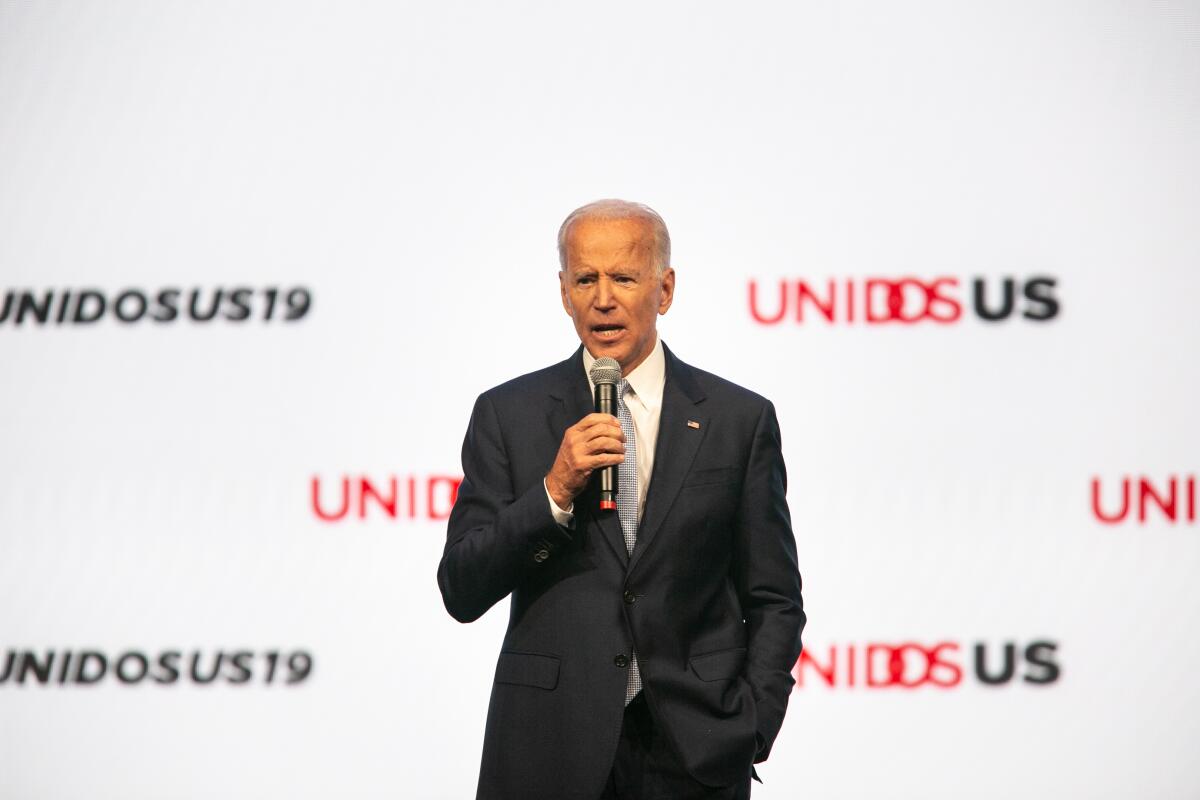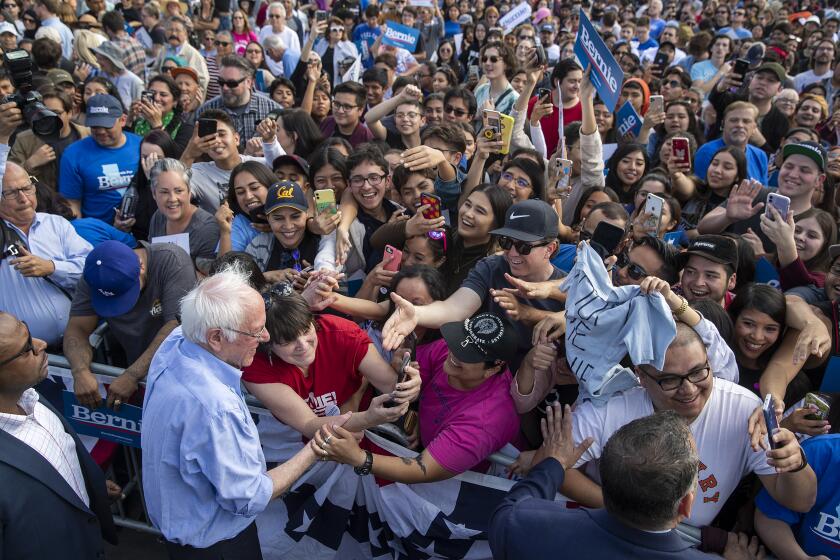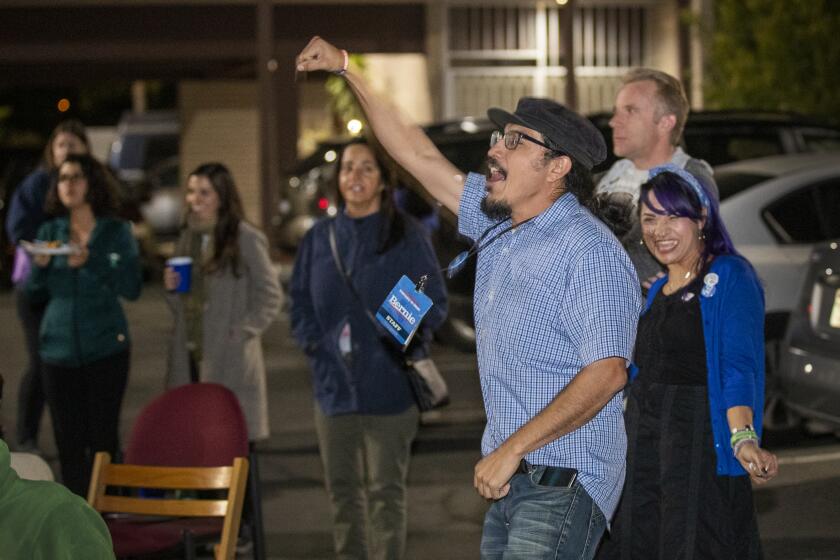Arizona and Florida primaries may test Joe Biden’s efforts to win over Latinos

- Share via
As Joe Biden hopes to extend his lead in the Democratic presidential race, Tuesday’s scheduled primaries in Arizona, Florida and Illinois will be a test of whether the former vice president can win over one of Bernie Sanders’ biggest bases of support: Latinos.
Biden’s advisors have attributed his soft support among Latinos to his campaign’s relative lack of resources for much of the primary season, something that is now being turned around with an influx of cash following his dominant showing on Super Tuesday.
Although activists and consultants say there’s little risk that most Latinos would abandon a Democratic nominee for President Trump, they say the Biden campaign still needs to step up its game to match Sanders in engaging a demographic that the party has long hoped to turn out in greater numbers.
“One of the basic rules of politics is the person who shows up and asks for your vote gets it over the person who doesn’t,” said Kristian Ramos, a Democratic consultant who is unaffiliated with any campaign. “In those early states, Sanders’ team showed up and knocked on those doors; there is not a lot of evidence that the other campaigns did. That has to change in the general election if we are going to take back the White House.”
Fifty-three percent of Latino voters in California plan to cast their ballot for Bernie Sanders, but not a single member of the powerful Latino Legislative Caucus has backed him.
Latinos make up sizable shares of the electorate in general-election battleground states such as Arizona, Florida, Pennsylvania and Nevada, making them a key part of any Democratic coalition hoping to beat Trump in November.
“The Democratic nominee needs to have a combination of winning over some moderates, probably some white voters, and maximizing turnout among black and Latino voters,” said Matt A. Barreto, faculty director of the Latino Policy and Politics Initiative at UCLA, which has tracked Sanders’ strong showings among Latinos in the Democratic primaries.
Sanders’ success in drawing Latinos to his 2020 campaign has been one of the Democratic primaries’ biggest storylines, propelling the left-wing candidate to victories in several Latino-heavy Western states, most notably California, the primaries’ most delegate-rich prize.
Learning from his defeat at the hands of Hillary Clinton in 2016, Bernie Sanders leaned heavily on community activists to win California.
Although Sanders has fallen behind Biden after failing to gain the support of more black and older voters, Sanders has done a good job of attracting Latino voters by running Spanish-language advertisements and hiring paid staff skilled in organizing in long-ignored communities, Barreto said.
“Biden has to catch up on that outreach if he’s going to be competitive with the Latino vote going forward,” Barreto said. “He was resting a lot on his name recognition and his association with [President] Obama.”
Activists have occasionally protested Biden for the Obama administration’s deportation of nearly 3 million immigrants. On Sunday, during a debate with Sanders, Biden announced that he would suspend deportations for immigrants in the country illegally for the first 100 days of his administration, except for those who had committed felonies, a position similar to the one held by Sanders, who wants to suspend deportations pending a review of immigration policy. But Biden also slipped and used the term “alien,” a term many find offensive. (Biden corrected himself to say “undocumented person.”)
Biden’s advisors say the problem with Latino outreach has not been one of substance, but of resources. With the campaign strapped for cash during the early primaries, the geyser of donations that erupted after he became the front-runner will enable him to hire more staff and run more advertisements specifically targeted at Latinos, they say.
The Sanders campaign “looked at Latino voters as a firewall and made very significant investments in the community that until recently we weren’t able to match,” said Cristóbal Alex, a senior Biden advisor.
The campaign is now placing Spanish-language TV, radio and digital ads in Arizona, Florida and Illinois. “What you’ll see Tuesday is a good example of what we hope to be able to do in a general election,” Alex said.
A Telemundo poll released last week showed Sanders leading Biden 47% to 40% among likely Latino voters in Arizona, something that is consistent with Sanders’ strength with Latinos in the West. The same poll showed Biden leading Sanders 48% to 37% in Florida, where Sanders’ comments praising literacy programs in communist Cuba were received poorly.
“If this guy [Sanders] is the nominee, he’s going to have to convince us that he understands the difference between an indoctrination program of a dictatorial regime and a literacy program,” said Jose Javier Rodriguez, a Florida state senator and Cuban American who supports Biden.
But Latinos in Florida are very different from Latinos in California, and Rodriguez thinks Biden is better positioned to address exile communities in Florida that have fled left-wing governments.
“I’ve been in the room when Vice President Biden has spoken with leaders of the Venezuelan exile community, and he knows very well what the dynamics are in terms of dealing with the really important foreign policy issues,” Rodriguez said.
Biden’s campaign is hopeful that his strength with Latinos in Florida can translate to strength in a matchup with President Trump.
“It’s very unlikely if not impossible for Donald Trump to win the White House without Florida,” Alex said. “We think with strong support from the Latino community, we’ll be able to win in Florida and cut off his pathway to the White House should we be lucky enough to be the nominee.”
Winning over younger and more progressive Latinos — for that matter, all young voters, who heavily support Sanders — will be Biden’s biggest challenge.
“He’s taken a clear stance, which resonates with me,” Mari Yepez, 27, said of Sanders, who has spoken forcefully on immigration-related issues and calls for the abolition of the Immigration and Customs Enforcement agency. Yepez is an organizer for Unite Here Local 11 in Arizona, which dually endorsed Sanders and Massachusetts Sen. Elizabeth Warren, who has since dropped out of the presidential race.
As of last week, Yepez hadn’t heard any Biden ads on Spanish-language radio. “This morning driving into work, I heard a Bernie ad three times,” Yepez said Wednesday.
But U.S. Rep. Ruben Gallego (D-Ariz.), 40, who recently endorsed Biden, thinks that Arizona Latinos view Biden fondly overall. Up until recently, the state had been a Republican stronghold, and “it was only the Obama-Biden administration that was fighting for us” in those years, Gallego said.
“Just because some of these voters are voting for Bernie does not mean that they won’t vote for Biden in the general,” Gallego said. “I think folks are misinterpreting somehow that these voters don’t like the [former] vice president. That’s horribly incorrect.”
As for Sanders’ stances on plans such as abolishing ICE, “there’s a subsection of very liberal young men and women who take that position,” but who “are not in the majority when it comes to the Latino population,” Gallego said.
But if Biden secures the nomination, he should be courting and hiring the skilled young Latino activists on Sanders’ side, even if some of them “said something nasty about [the Biden campaign] on Twitter,” Barreto said.
“You probably don’t want a 70-year-old white guy and his supporters running the strategy of ‘How do we mobilize a 24-year-old millennial?’” Barreto said. “You probably want a 25-year-old millennial running that. That’s what Sanders did.”
More to Read
Get the L.A. Times Politics newsletter
Deeply reported insights into legislation, politics and policy from Sacramento, Washington and beyond. In your inbox three times per week.
You may occasionally receive promotional content from the Los Angeles Times.













